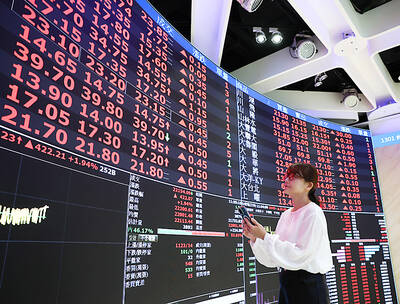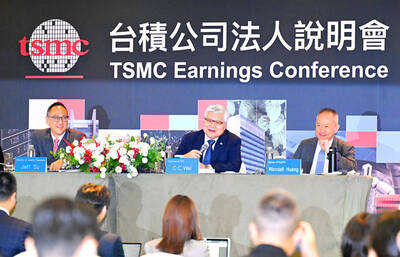With its first batches of own-brand frozen meals hitting shelves last week, 7-Eleven, the nation’s largest convenience chain store, is hoping to tap the growing number of people who prefer to eat fast, convenient ready-made meals.
The store unveiled its 10 frozen packaged meals — with selections from spaghetti, fried rice and pizza to chicken wings — for NT$28 (US$0.80) each.
“Hypermarkets may overlook consumers’ needs with their big, family-sized packaged meals,” said Tony Tsai (蔡篤昌), marketing vice president for President Chain Store Corp (統一超商), which runs 7-Eleven stores in Taiwan. “There are single people and DINKs [double income, no kids] out there and we are offering them value-for-money meals as an alternative.”
The frozen meals, which consumers can heat up in a microwave, have proven popular in Japan and Taiwanese have a growing appetite for them too, he told a press briefing yesterday.
Currently, 7-Eleven has nearly 300 own-brand items on its shelves, accounting for 10 percent of the 3,000 items on sales.
Own-brand revenues make up more than 10 percent of total sales and the figure is set to rise as the store operator aims to introduce more own-brand items in the future, the company said.
7-Eleven is gearing up for heated competition as retailers slash prices to boost sales amid sagging consumer spending.

UNCERTAINTIES: Exports surged 34.1% and private investment grew 7.03% to outpace expectations in the first half, although US tariffs could stall momentum The Chung-Hua Institution for Economic Research (CIER, 中華經濟研究院) yesterday raised its GDP growth forecast to 3.05 percent this year on a robust first-half performance, but warned that US tariff threats and external uncertainty could stall momentum in the second half of the year. “The first half proved exceptionally strong, allowing room for optimism,” CIER president Lien Hsien-ming (連賢明) said. “But the growth momentum may slow moving forward due to US tariffs.” The tariff threat poses definite downside risks, although the scale of the impact remains unclear given the unpredictability of US President Donald Trump’s policies, Lien said. Despite the headwinds, Taiwan is likely

READY TO BUY: Shortly after Nvidia announced the approval, Chinese firms scrambled to order the H20 GPUs, which the company must send to the US government for approval Nvidia Corp chief executive officer Jensen Huang (黃仁勳) late on Monday said the technology giant has won approval from US President Donald Trump’s administration to sell its advanced H20 graphics processing units (GPUs) used to develop artificial intelligence (AI) to China. The news came in a company blog post late on Monday and Huang also spoke about the coup on China’s state-run China Global Television Network in remarks shown on X. “The US government has assured Nvidia that licenses will be granted, and Nvidia hopes to start deliveries soon,” the post said. “Today, I’m announcing that the US government has approved for us

The National Stabilization Fund (NSF, 國安基金) is to continue supporting local shares, as uncertainties in international politics and the economy could affect Taiwanese industries’ global deployment and corporate profits, as well as affect stock movement and investor confidence, the Ministry of Finance said in a statement yesterday. The NT$500 billion (US$17.1 billion) fund would remain active in the stock market as the US’ tariff measures have not yet been fully finalized, which would drive international capital flows and global supply chain restructuring, the ministry said after the a meeting of the fund’s steering committee. Along with ongoing geopolitical risks and an unfavorable

DEMAND: The forecast did not factor in potential increases from lifted US restrictions on Nvidia’s H20 chips to China, which TSMC CEO C.C. Wei described as ‘good news’ Taiwan Semiconductor Manufacturing Co (TSMC, 台積電), a major chip supplier to Nvidia Corp, yesterday raised its revenue growth forecast for this year to 30 percent in US dollar terms, thanks to exceptionally strong demand for artificial intelligence (AI) and high-performance computing (HPC) applications. The new revenue growth forecast surpasses the 25 percent expansion estimated by TSMC three months ago and beat almost all industry analysts’ expectations. Booming AI demand helped propel the chipmaker’s net profit by 60.7 percent last quarter to a record high of NT$398.27 billion (US$13.54 billion), from NT$247.85 billion a year earlier. That represented a sequential increase of 10.2